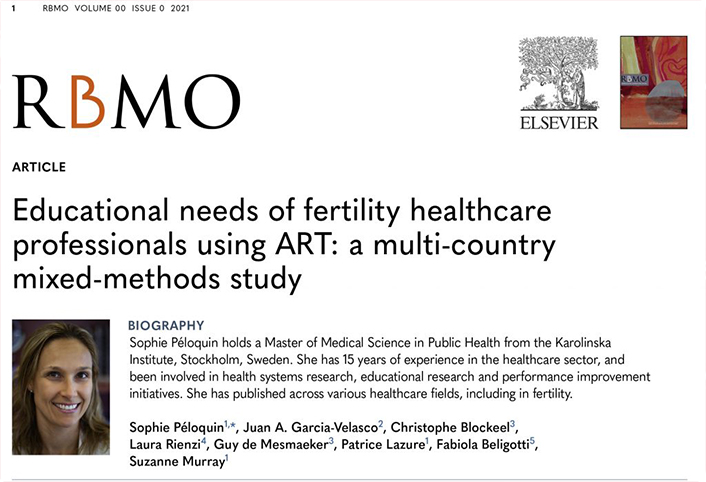
Educational needs of fertility healthcare professionals using ART: a multi-country mixed-methods study
Sophie Péloquin, Juan A. Garcia-Velasco, Christophe Blockeel, Laura Rienzi, Guy de Mesmaeker, Patrice Lazure, Fabiola Beligotti, Suzanne Murray
RBMO Reproductive BioMedicine online 2 July 2021, https://doi.org/10.1016/j.rbmo.2021.06.020
ABSTRACT
Research question: What are the most pressing educational needs of fertility healthcare professionals using assisted reproductive technologies (ART)?
Design: This mixed-methods study combined qualitative interviews with quantitative surveys. Participants included physicians and nurses specialized in reproductive endocrinology or in obstetrics/gynaecology, and laboratory specialists, with a minimum of 3 years of experience, practising in Australia, Brazil, Canada, China, France, Germany, India, Italy, Japan, Mexico, Spain or the UK. Maximum variation purposive sampling was used to ensure a mix of experience and settings. Interviews were transcribed and coded through thematic analysis. Quantitative data were analysed using frequency tables, cross-tabulations and chi-squared tests to compare results by reimbursement context.
Results: A total of 535 participants were included (273 physicians, 145 nurses and 117 laboratory specialists). Knowledge gaps, skills gaps and attitude issues were identified in relation to: (i) ovarian stimulation (e.g. knowledge of treatments and instruction protocols for ovarian stimulation), (ii) embryo culture and cryopreservation/vitrification (e.g. diverging opinions on embryo freezing, (iii) embryo assessment (e.g. performing genetic testing), (iv) support of luteal phase and optimizing pregnancy outcomes (e.g. knowledge of assessment methods for endometrial receptivity), and (v) communication with patients (e.g. reluctance to address emotional distress).
Conclusions: This descriptive, exploratory study corroborates previously reported gaps in fertility care and identifies potential causes of these gaps. Findings provide evidence to inform educational programmes for healthcare professionals who use ART in their practice and calls for the development of case-based education and interprofessional training programmes to improve care for patients with fertility issues.

